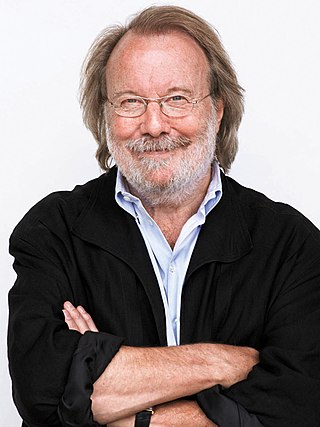
Göran BrorBennyAndersson is a Swedish musician, composer and producer best known as a member of the pop group ABBA and co-composer of the musicals Chess, Kristina från Duvemåla, and Mamma Mia! For the 2008 film version of Mamma Mia! and its 2018 sequel, Mamma Mia! Here We Go Again, he worked also as an executive producer. Since 2001, he has been active with his own band Benny Anderssons orkester.

The Prisoner is a British television series created by Patrick McGoohan, with possible contributions from George Markstein. McGoohan portrays Number Six, an unnamed British intelligence agent who is abducted and imprisoned in a mysterious coastal village after resigning from his position. The allegorical plotlines of the series contain elements of science fiction, psychological drama, and spy fiction. It was produced by Everyman Films for distribution by Lew Grade's ITC Entertainment.

Dame Margaret Taylor Rutherford, was an English actress of stage, film and television.
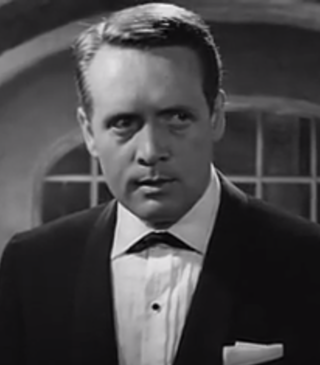
Patrick Joseph McGoohan was an American-born Irish actor, director, screenwriter, and producer of film, television, and theatre. Born in New York City to Irish parents, he was raised in Ireland and England, began his career in England during the 1950s and became well known for the titular role, secret agent John Drake in the ITC espionage programme Danger Man (1960–1968). He then produced and created The Prisoner (1967–1968), a surrealistic television series in which he featured as Number Six, an unnamed British intelligence agent who is abducted and imprisoned in a mysterious coastal village.

Born Free is a 1966 British drama film starring the real-life couple Virginia McKenna and Bill Travers as Joy and George Adamson, another real-life couple, who raised Elsa the Lioness, an orphaned lion cub, to adulthood and released her into the wilderness of Kenya. The film was produced by Open Road Films Ltd. and Columbia Pictures. The screenplay, written by blacklisted Hollywood writer Lester Cole, was based upon Joy Adamson's 1960 non-fiction book Born Free. The film was directed by James Hill and produced by Sam Jaffe and Paul Radin. Born Free, and its musical score, by John Barry, as well as the title song, with lyrics by Don Black and sung by Matt Monro, won numerous awards.
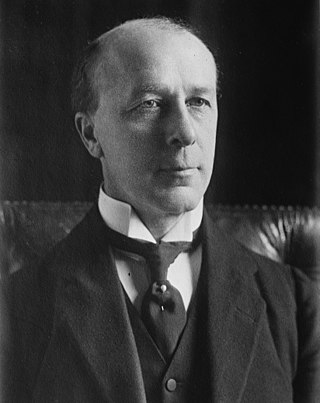
Reginald McKenna was a British banker and Liberal politician. His first Cabinet post under Henry Campbell-Bannerman was as President of the Board of Education, after which he served as First Lord of the Admiralty. His most important roles were as Home Secretary and Chancellor of the Exchequer during the premiership of H. H. Asquith. He was studious and meticulous, noted for his attention to detail, but also for being bureaucratic and partisan.

Dame Virginia Anne McKenna is a British stage and screen actress, author, animal rights activist, and wildlife campaigner. She is best known for the films A Town Like Alice (1956), Carve Her Name with Pride (1958), Born Free (1966), and Ring of Bright Water (1969), as well as her work with the Born Free Foundation.
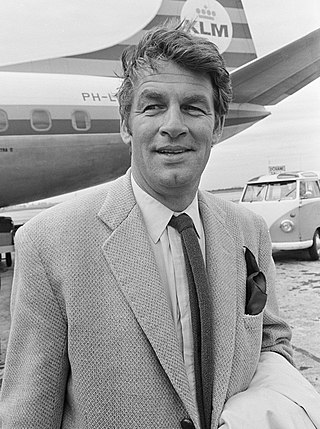
William Inglis Lindon Travers was a British actor, screenwriter, director and animal rights activist. Before his show business career, he served in the British Army with Gurkha and special forces units.

All Night Long is a 1962 British neo noir drama film directed by Basil Dearden and starring Patrick McGoohan, Keith Michell, Betsy Blair, Paul Harris, Marti Stevens, and Richard Attenborough. The story by Nel King and Paul Jarrico is an updated version of William Shakespeare's Othello, set in the London jazz scene of the 1960s. The action takes place in a single evening, during an anniversary party. The black-and-white film features performances by several prominent British jazz musicians—among them John Dankworth and Tubby Hayes—as well as the Americans Dave Brubeck and Charles Mingus, who were in the UK in 1961 when filming took place and were recruited to participate.
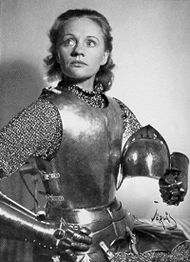
Gunn Wållgren (born Gunnel Margaret Haraldsdotter Wållgren; ; was a Swedish stage and film actress. She is best remembered for her role in Ingmar Bergman's film Fanny and Alexander.
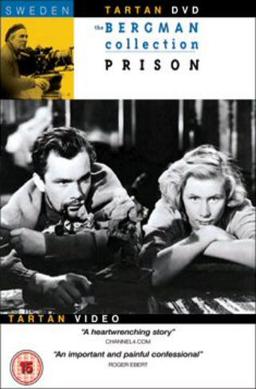
Prison, also known as The Devil's Wanton in the United States, is a 1949 Swedish drama film directed by Ingmar Bergman. It is the earliest film directed by Bergman to be based on his own original screenplay.
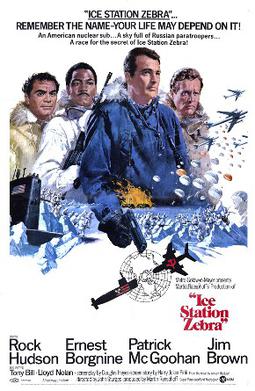
Ice Station Zebra is a 1968 American espionage thriller film directed by John Sturges and starring Rock Hudson, Patrick McGoohan, Ernest Borgnine, and Jim Brown. The screenplay is by Douglas Heyes, Harry Julian Fink, and W. R. Burnett, loosely based on Alistair MacLean's 1963 novel. Both have parallels to real-life events that took place in 1959. The film concerns a US nuclear submarine that must rush to the North Pole to rescue the members of the Ice Station Zebra.

Alf Kjellin was a Swedish film actor and director, who also appeared on some television shows.
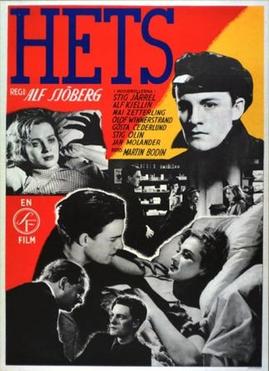
Torment is a 1944 Swedish film, directed by Alf Sjöberg from a screenplay by Ingmar Bergman. The film, a tale of sex, passion and murder, was originally released as Frenzy in the United Kingdom, although later releases have used the US title. The film won the Grand Prix at the 1946 Cannes Film Festival.

The Case of the Frightened Lady is a 1940 British, black-and-white, crime, drama, mystery thriller, directed by George King and starring Marius Goring as Lord Lebanon, Helen Haye as Lady Lebanon, Penelope Dudley Ward as Isla Crane, George Merritt (actor) as Detective Inspector Tanner, Ronald Shiner as Detective Sergeant Totty and Felix Aylmer as Dr Amersham. It was produced by Pennant Picture Productions and presented by British Lion Film Corporation. The film is based on the 1931 play by Edgar Wallace.
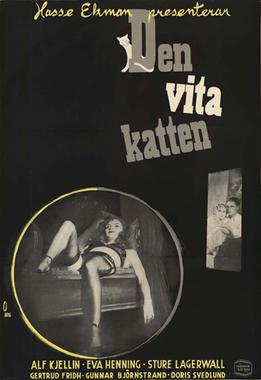
The White Cat (Swedish: Den vita katten is a 1950 Swedish mystery drama film directed by Hasse Ekman and starring Alf Kjellin, Eva Henning and Sture Lagerwall.
Herman "Erik" Nordgren was a Swedish composer, arranger and bandleader.
Kanske en gentleman is a Swedish drama film from 1935 directed by Ragnar Arvedson and Tancred Ibsen. The film script was written by Theodor Berthels, Berndt Carlberg, and Ulla Kåge. It was base on George Bernard Shaw's play Pygmalion.

I Killed or I Slew is a 1943 Swedish drama film directed by Olof Molander and starring Anders Henrikson, Arnold Sjöstrand and Irma Christenson. It was shot at the Centrumateljéerna Studios in Stockholm. The film's sets were designed by the art director Bibi Lindström. It is a remake of the 1942 Norwegian film Jeg drepte!.
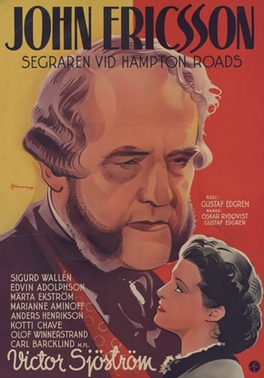
John Ericsson, Victor of Hampton Roads is a 1937 Swedish historical drama film directed by Gustaf Edgren and starring Victor Sjöström, Märta Ekström and Anders Henrikson. It is a biographical film of the nineteenth century Swedish engineer and inventor John Ericsson, known for his work in Britain and the United States. The title refers to the 1862 Battle of Hampton Roads in the American Civil War, which featured the warship USS Monitor designed by Ericsson.


















